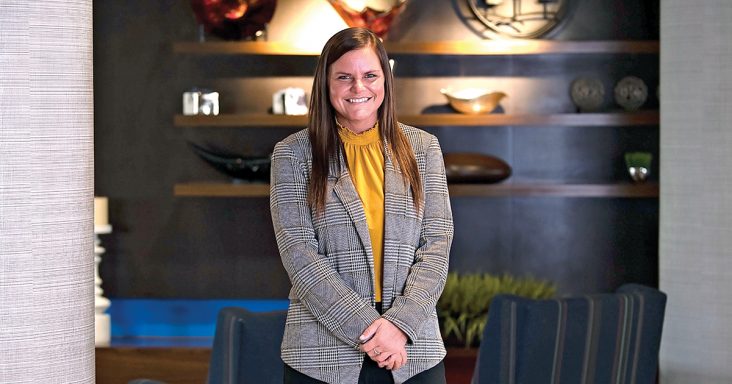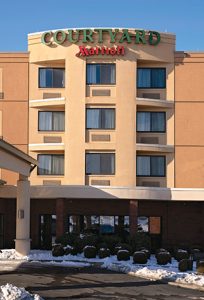‘Shocking disbelief’: As the COVID-19 pandemic shut down travel, 2020 became the worst year on record for the U.S. hotel industry
by March 9, 2021 10:50 am 1,942 views

Erica Vaughan is the sales director for Fayetteville hotels Courtyard by Marriott and Hyatt Place.
Erica Vaughan’s office phone began to ring about 2 p.m. on March 12, 2020. By the end of the day, she had lost $900,000 in sales revenue due to concerns about the COVID-19 pandemic.
“March 12, 2020, is a day I will never forget in my 17-year hotel career,” said Vaughan, director of sales for Fayetteville hotels Courtyard by Marriott and Hyatt Place. “I received phone calls, one after the other, from SEC sports teams, NCAA track & field, basketball, baseball, softball, swimming and diving, tennis … that they were canceling their entire season for 2020. I had never seen cancellations like this before.”
The next day, Gov. Asa Hutchinson declared a state of emergency because of the pandemic. That’s when corporations, weddings and leisure guests began to cancel.
“It was another day of shocking disbelief,” Vaughan recalled. “We watched the news for the remainder of the day as they showed the country shutting down, one state at a time. My heart began to sink.”
The cancellations continued for three more weeks until there was no business at her hotel. No food and beverage, no pool, no fitness center, no meeting space. No guests.
“It really hit home for me about mid-April when hotels began to shut down around Northwest Arkansas,” she said. “When you think of the hotel industry, you think of job security, because people are always going to travel. For the first time, people were not traveling. It was as if the world had stopped, grew quiet and dark.”
Courtyard by Marriott in Fayetteville lost almost $2 million in 2020, with occupancy going from 95% in 2019 to as low as 20% in 2020. Revenue per available room (RevPAR), fell from $149 in 2019 to $118 in 2020. RevPAR, calculated by multiplying daily room rate by occupancy rate, reflects a property’s ability to fill available rooms. Average daily rate (ADR), the average price of a room sold, fell from $147 in 2019 to $84 in 2020. At the lowest point of 2020, Vaughan laid off 85% of her staff.
WORST YEAR ON RECORD
The pandemic swept the country, making 2020 officially the worst year on record for the U.S. hotel industry, according to lodging data firm STR. Profitability fell 85%. For the first time ever, the industry surpassed 1 billion unsold room nights, far surpassing the 786 million unsold room nights in 2009 during the Great Recession.
Business and leisure travel dried up in Northwest Arkansas. Visit Bentonville, the city’s tourism bureau funded by a 2% tax on lodging and 1% tax on restaurants, saw a 30% decline in receipts in 2020. With the exception of a 7% drop during 2009, Visit Bentonville saw year-over-year growth for 15 years, said Kalene Griffith, Visit Bentonville’s president and CEO.
At the lowest point of the pandemic, Annette Nichols, general manager of Hyatt Place Rogers/Bentonville, closed her hotel’s top three floors and laid off 90% of the staff, going from 33 employees down to six.
“Myself, my assistant general manager and my director of sales became full-time housekeeping, laundry and shuttle drivers,” she said. “We dropped from 100% occupancy Monday through Wednesday nights and 80% on Thursdays, down to maybe 15% to 20% per night, and that was pretty much all air crews [from Northwest Arkansas National Airport].”
Dropping rates drastically, the hotels’ ADR went from $115 in 2019 to $80 in 2020, with RevPAR falling to $32 from $88 in 2019. Nichols sold 15,000 fewer rooms. Fixed costs didn’t change, making it difficult to support the business.
BUSINESS & LEISURE
As Northwest Arkansas corporations sent their employees home to work — most notably Walmart Inc. — suppliers no longer flew to the region to do business.
“Business travel has a huge impact on our hotels,” Griffith said. “Normally, Monday through Wednesday hotel occupancy was 80% to 100% because of the business traveler.”
Hotel executives agreed that corporate travel won’t fully return until Walmart goes back to the home office later this year.
“Everybody’s paycheck is depending on it,” Nichols said. “They’re a huge company in this area. Business travel is important for the entire market,” Nichols added that she knows health and safety are more important considerations than travel.
Vaughan’s clients in the “top five big companies” in the area have told her that “once all the employees are vaccinated — or 80% of them — they will return to their offices and hopefully travel again.” But for some companies, the pandemic will prove travel is unnecessary and they won’t reinstate it. “Other businesses are going to suffer because of that,” she said.
Leisure travel, which area hotels never counted on, became the saving grace.
“We depend on it now more than ever,” Nichols said. “Third parties like Expedia, Hotel.com, Booking.com. Without them no one would be surviving in any hotel nationwide.”
In June, families looking for destinations with outdoor experiences began to come to the area, Griffith said. Many of Vaughan’s guests have been “people getting their stimulus checks who are tired of being stuck in the house and are traveling on weekends.”
Youth and college sports groups are coming back in 2021.
“That’s pretty much the only market traveling right now,” Vaughan said. “We’ve had sports teams in house since the second weekend of January and we’ll continue to almost the end of July.”

With more room availability due to lack of corporate travel, Vaughan’s group sales are up. She sold 38 rooms last year compared to 382 this year because, with pandemic concerns, groups are putting just one person in a room.
Arts and cycling groups are calling Visit Bentonville about holding events in the city.
“We anticipate our fall will be amazing in Bentonville with events like Oz Trails Off-Road, OuterBike, Life Time Big Sugar Gravel Race and 13 softball or baseball tournaments,” Griffith said.
After the COVID vaccine is widely available by mid- to late summer, Griffith believes consumer confidence will grow and people will travel.
COMING BACK
With travel slowly coming back, Griffith’s team is “being proactive with what’s next rather than dwelling on where we are.”
Visit Bentonville launched “Our Bentonville — Be Safe & Be Smart” campaign and began regular calls with Bentonville hotel management teams to keep them updated on changes coming from the state.
The tourism bureau also launched an aggressive campaign to meeting planners and sports events organizers in areas that have a direct flight to Northwest Arkansas National Airport, and in the six states that are within driving distance to the area.
To fill the Courtyard by Marriott, Vaughan offered “thank-you” rates for truck drivers, healthcare workers, first responders and teachers, and “work from home day rates” for those who needed to get away from kids or spouse to work for a day. That sold 819 rooms.
Although both dropped their rates, neither Vaughan nor Nichols wanted that to be a long-term solution.
“Our brand told us not to drop rates,” Vaughan said. “Marriott did that in 2008 and it took almost four years to get the rate back to what it was. Your expenses are the same, regardless. Some people think a head in a bed is better than not, but in reality, the lower your rate is, the more wear and tear on your rooms because you attract a different kind of client.”
The federal CARES Act business interruption grant program allocated $48 million for hotels, restaurants, personal care and recreation, but Nichols’ owner group, McKibbon Hospitality, was denied grants for its four Arkansas hotels. Nichols’ hotel did receive a small grant to assist with COVID-related expenses as part of the Arkansas Ready for Business grant program.
Hyatt Place Rogers/Bentonville received $184,000 from the state to help fund hotel losses in 2020.
“We don’t expect more at this time based on the new bill the Biden administration is trying to pass,” she said. “Hotels and restaurants again have been left out. Any help would be great for our industries since we’ve been impacted the most. I don’t think people realize the severity of the issue.”
In October, the Courtyard by Marriott in Fayetteville began a turnaround and occupancy is 69% for 2021, with ADR of $118. RevPAR has grown to $180.
“We’re still down about $200,000 for this year because the corporate traveler is not in house,” Vaughan said. She doesn’t think her business will return to 2019 levels until 2024 or 2025.
Fayetteville’s Hyatt Place, Vaughan’s newest property, opens March 10.
“We’re excited about opening during NCAA Men’s and Women’s Indoor Track and Field Championships, and are sold out for the opening,” she said. “We’re looking forward to a perfect sale [every room occupied] for the first time in over a year.”
Hyatt Place Rogers/Bentonville has yet to see a turnaround but is hopeful the vaccine rollout and mask-wearing will mean business will begin to turn around in the third quarter.
“The hospitality business is huge in Arkansas,” she said. “We need it to come back.”
